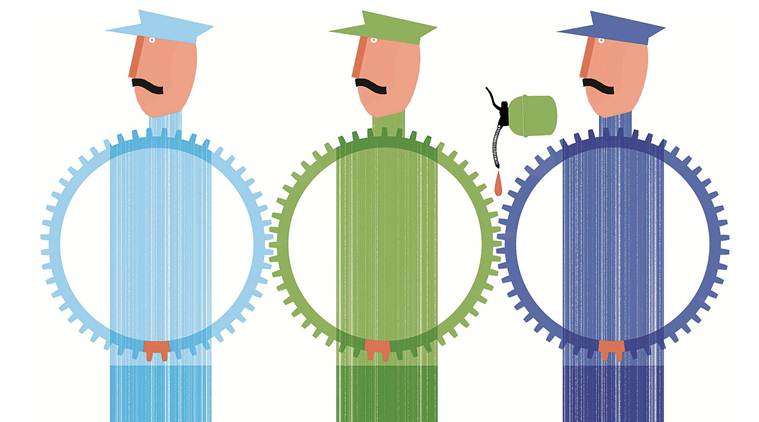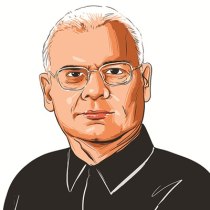Why theatre commands is an unnecessary idea
They will require large increase in defence expenditure with doubtful returns. Country should focus on modernising its forces and innovating strategic solutions

We must be realistic about where India stands. Our focus is on defending our territory and we need to structure our forces and strategy accordingly. (Illustration: CR Sasikumar)
There have been murmurs of a debate in recent days about the idea of forming three integrated military Theatre Commands, covering the Northern, Eastern and Southern territory, that would subsume all operational functions of the existing 19 predominantly single-service commands in their respective geographical areas. The Theatre Command concept is over-simplified. Conceptually, one visualises large theatre operations like Normandy landings and other World War II campaigns that involved large manoeuvering armies. However, technology now offers stand-off means and special weapons that can degrade and destroy the enemy’s potential effectively and reduce the need for direct confrontation. The days of large manoeuvering armies are over, especially in a nuclear-threat scenario.
We must be realistic about where India stands. Our focus is on defending our territory and we need to structure our forces and strategy accordingly. Interestingly, the current responsibilities of the 19 commands towards administering, training, equipping and supporting the forces under their charge would in no way diminish if such Theatre Commands are formed. The creation of few more general rank posts would be sought. Do we really need to get organisationally so top-heavy — it is so even now — thereby diluting the ranks? There is scope to “de-brass” the military even in the current structure by reducing the number of two and three stars and improving the teeth-to-tail ratio.
In military planning, one must consider India’s needs and challenges. India is one of the fastest-growing economies of the world and promotes its image as a peace-loving, mature and a dependable power. Many nations in its neighbourhood are economically weak and depend on India for their own progress. However, India is still a developing country and its economy may not be strong enough to withstand many storms. Dividing the country into military theatres sounds jingoist. Having attended several Cabinet Committee on Security deliberations when the country nearly went into war, I learnt that any battle that India may be compelled to enter must remain short and swift.
In this present scenario, forming Theatre Commands would demand large increase in expenditure with doubtful returns. Before we embark on a new organisation, the government must evaluate the efficacy of the current Integrated Defence Headquarters including the two joint commands — the Strategic Forces Command and ANC (Andaman and Nicobar Command). The core issue to be addressed when considering the Theatre Command is whether the current structure helps the Services to coordinate and mount joint operations effectively. Would a new organisation improve “jointness”?
I recall some examples from my own experience of Inter-Service co-operation and jointness. One night, well past midnight, few years after the Kargil conflict, I received a call from the then army chief about an adversary having sneaked up a mountain in our territory and occupied a part of it. He wanted an early air strike on that hilltop. I understood the need and importance of speed and secrecy. Before long, we met the defence minister and the situation was explained. He gave us a go ahead and told us that he would keep the PM informed. There was a couple of days’ delay in mounting the strike due to weather, logistics and the time taken in getting the final clearance.
The strike warranted the use of a type of aircraft that was based 1,500-km away, weapons at another base, an interim base for launching the strike and senior pilots for executing the mission at yet another base. Since every message and call was monitored from across the border, we communicated only in person. No signals or orders were issued. A designated Air Force Commander took charge and flew down to the hills and met the field commander concerned and got the briefing about the target. He flew down to the fighter base that was to mount the operations and then to the parent base of the squadron that would execute the mission. Eight aircraft flew a circuitous route over the mountains and landed at a base unannounced. Weapons were loaded and the strikes having been carried out, they returned directly to their home base.
The mission was a success. The news broke in the media after many days. We possibly avoided another Kargil-like situation. In this instance, there was no lack of jointness, though the process followed was unorthodox and demonstrated flexibility. A Theatre Command will not have the resources to mount such an operation or the freedom to decide. The air force is organised and trained to plan operations centrally to exercise the best possible choice and the execution is delegated. Resources and skills being limited, they are spread out geographically. There have been many such instances of outstanding cooperation with other Services. We do not have to imitate the US or NATO structures or their drills. We should evolve our own ways that can swiftly achieve results at minimal cost avoiding collateral damage and losses. We can do so by evaluating organisations and operations for cost-effectiveness.
While the idea of a Theatre Command may seemingly have some operational advantage, the permanency of dividing our own territory into Operational Theatres as a defence measure seems preposterous. And to state that such a division is required to defend our country more effectively sounds alarming. International press for one, not to mention our adversaries, would have a field day with the news that could be interpreted in many ways — to exercise tighter political control could be one. In recent times, no progressive country has created Theatre Commands to defend its home territory. The Western militaries call themselves expeditionary forces (our military is termed as defence forces) typically meant to create joint command not for home-defence but to project their power overseas. The Falkland conflict was one interesting example wherein the expeditionary force sailed 8,000 miles from UK to reach Falkland. The force was headed by an admiral and on disembarking, the leadership shifted to an army general.
Even after the establishment of Theatre Commands, the responsibility of the country’s air defence would remain with the air force and so also offensive air operations and strategic and tactical air transport support for the entire gamut of operations. IAF assets, including special weapons, are limited in number and are distributed across the country, which require base-installation support. It is not possible to triplicate or quadruplicate them to every Theatre Command. Same is the case with skilled personnel and EW (electronic warfare) and C4ISR (command, control, computers, communications, intelligence and reconnaissance) equipment. Moreover, the IAF has a serious shortfall in strength of combat squadrons. Our combat squadron strength may never reach the reasonable figure of 45.
In future wars, we expect military actions to be swift and the objectives to be met in days or weeks. This could be a tall order if we plan a large manoeuvering army or the navy in blue-water leaving the coast to the coast guard. The essentials are special forces, special weapons, stealth, integrated surveillance and communication. We should focus on modernising our strategic thinking and innovate solutions to meet our challenges. These requirements are not feasible unless we trim the flab. The formation of a Theatre Command at a juncture when we are lagging behind on modernisation would not be in the best interest of the nation.
The writer is a former Chief of Air Staff
For all the latest Opinion News, download Indian Express App







































No hay comentarios:
Publicar un comentario